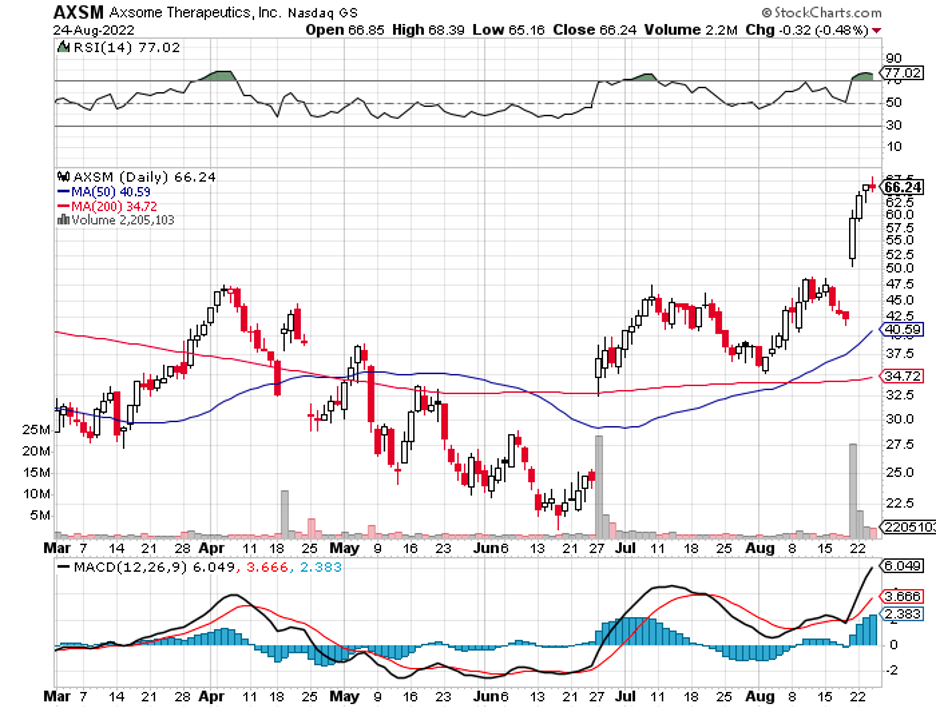A Risk Worth Taking
When a drugmaker does not deliver a new product within the promised timeframe, its shares generally drop.
When this happens, investors should take a closer look at regulatory headwinds as potential buying opportunities, especially in the biotechnology world.
However, it’s important to determine whether the business in question can satisfactorily address the issues raised by the regulators and eventually get the green light for the held-up product.
Several companies find themselves in this scenario, but a particular one looks promising: Axsome Therapeutics (AXSM).
While Axsome isn’t one of the most renowned biotechs and its shares may look somewhat risky, it’s worth considering initiating positions in this growing company.
One reason is Axsome’s recent victory over a hurdle, finally gaining the long-awaited FDA approval for its depression drug that can take effect within just 1 week because it uses a unique mechanism instead of the traditional elements.
The drug, previously known as AXS-05, will be marketed as Auvelity and slated for sale in the fourth quarter of 2022.
For months, investors have been closely monitoring the progress and approval of this drug with some concern.
Doubts over Axsome’s capacity to deliver started to hound the company, especially after FDA’s self-imposed approval deadline for AXS-05 passed in 2021.
However, the company attributed the delay to the pandemic and shrugged off concerns over the actual drug.
Auvelity is the first of a class of drugs, which are classified as NMDA receptor antagonists, to be marketed in pill form created as a treatment for depression.
It is the only approved pill working as a fast-acting drug targeting major depressive disorder. This will also be Axsome’s first-ever marketed product.
Other than Axsome, there are several biotechs working on antidepressant treatments.
Among them, the closest potential competitors are Sage Therapeutics (SAGE) and Relmada Therapeutics (RLMD).
Sage recently started rolling out its own candidate, Zuranalone, for approval as a treatment for major depressive disorder.
Relmada is also working on a similar candidate, REL-1017, but seems to be at an earlier stage.
Psychiatric treatments like Auvelity are widely sought after and highly coveted assets in the biopharma world for a myriad of reasons.
The sheer potential of Auvelity puts Axsome on buyout watch for several Big Pharma and even expanding biotechnology and healthcare companies today.
Moreover, Axsome’s major depressive disorder drug would dovetail conveniently with the lineups of a lot of leading pharmaceutical names in the industry including Pfizer (PFE), Eli Lilly (LLY), Bristol-Myers Squibb (BMY), and even Biogen (BIIB).
With that in mind, Axsome’s brain trust would most likely demand an astronomical premium based on or relative to its current valuation if it ever enters any buyout discussion with interested suitors.
Auvelity sales are projected to hit $209.1 million in 2023, growing impressively to blockbuster status by 2027 at $1.5 billion.
By 2030, sales of this major depressive disorder drug are estimated to reach $2 billion every year.
Auvelity is made up of two drugs that physicians already readily prescribe and are comfortable with for years; one of which is bupropion.
Bupropion, marketed under the brand name Zyban, actually raked in blockbuster sales marketed as a smoking cessation treatment.
Hence, Axsome plans to leverage the success of Auvelity to begin a pivotal study that could utilize this major depressive disorder as a smoking cessation treatment as well.
On top of these, Axsome is anticipating another FDA approval in the next months.
The company submitted its new migraine treatment, AXS-07, for review in 2021. Like Auvelity, it encountered delays due to the pandemic. However, things seem to be moving along as the regulatory committees catch up.
By 2023, Axsome plans to submit another candidate for FDA approval. Clinical trial results for its fibromyalgia treatment, AXS-14, recently released positive data.
So, what now?
When investing in biotech, it’s always good to keep in mind that extreme volatility is an ever-present risk. This makes the sector unfit for those looking for short-term investments.
For Axsome, the biggest challenge today is showing that Auvelity sales can support the development of AXS-07 and AXS-14 and fund operations into 2024 without the need to ask shareholders for more capital.
However, even if Auvelity fails to deliver strong revenues in 2023, the rest of the company’s late-stage pipeline still looks pretty exciting.
Taken together, Axsome looks like a promising stock to invest in as a relatively small portion of a diversified biotech portfolio.

